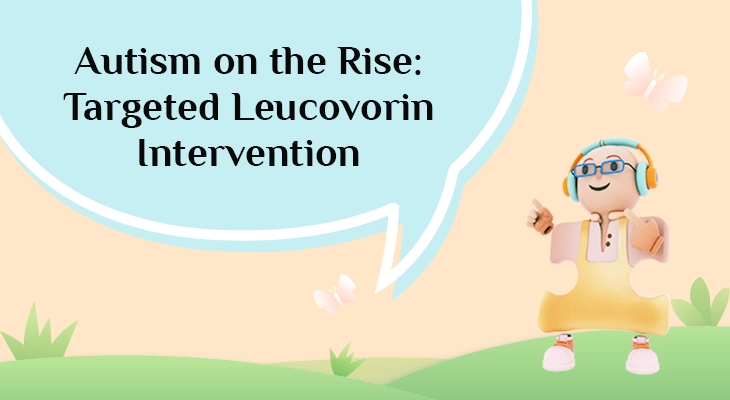
Introduction
Folate receptor autoantibodies (FRAs) are antibodies that target the folate receptor alpha (FRα), a protein responsible for transporting folate into cells, including across the blood-brain barrier and the placenta. These autoantibodies can block or interfere with the normal functioning of the folate receptor, leading to reduced folate availability in critical tissues, such as the brain, developing fetus, or other organs.
Types of Folate Receptor Autoantibodies:
- Blocking Antibodies: These prevent folate from binding to the folate receptor, directly reducing the uptake of folate into cells.
- Binding Antibodies: These attach to the folate receptor and can interfere indirectly by causing immune activation or altering receptor function.
Effects of FRAs:
- Reduced Folate Transport: By impairing the transport of folate into cells, FRAs can lead to localized folate deficiency, even when blood folate levels are normal.
- Increased Risk of Neurological and Developmental Issues: Reduced folate availability in the brain or during fetal development has been linked to neurological, psychiatric, and developmental conditions.
With this in mind, the question becomes in what other conditions have folate receptor autoantibodies been found? We know that they are highly prevalent in those that have autism spectrum disorder, but have they been found in other neurodevelopmental/neuropsychiatric disorders? The answer is yes. Let’s review some of these areas.
DEPRESSION
There is some evidence linking folate receptor autoantibodies (FRAs) to depression, though the research is still emerging and limited.
Folate plays a critical role in brain function, as it is involved in the synthesis of neurotransmitters like serotonin, dopamine, and norepinephrine. Reduced folate levels in the brain have been associated with depression. Folate receptor autoantibodies (FRAs) can disrupt the transport of folate across the blood-brain barrier by blocking the function of the folate receptor alpha (FRα). This can lead to a deficiency of folate in the central nervous system (CNS), which may contribute to neuropsychiatric conditions, including depression.
Research Findings:
- FRAs and Folate Deficiency: Studies in other conditions, such as cerebral folate deficiency and autism spectrum disorders, have shown that FRAs can impair CNS folate levels. This mechanism could potentially contribute to the pathophysiology of depression, as folate deficiency is a known risk factor for depressive symptoms.
- Folate Supplementation in Depression: Folate and its active form, L-methylfolate, have been used as adjunctive treatments for depression, particularly in individuals who do not respond adequately to traditional antidepressants. The presence of FRAs might explain why some individuals have folate-related depression despite normal dietary intake or blood folate levels.
- Inflammatory Link: Depression has been associated with systemic inflammation, and FRAs could be part of this broader inflammatory process. Autoantibodies like FRAs might contribute to neuroinflammation, which has been implicated in depression.
Limitations of Current Research:
- Most studies on FRAs have focused on conditions like autism and cerebral folate deficiency, with limited direct research on their prevalence in depression.
- The exact prevalence of FRAs in individuals with depression is not well-established, and larger studies are needed to clarify this relationship.
More research is certainly needed in the area of depression.
PREGNANCY
Interestingly, folate receptor autoantibodies (FRAs) have also been implicated in some cases of miscarriage, particularly recurrent miscarriages. These autoantibodies can interfere with the transport of folate into cells, leading to folate deficiency, which is crucial for DNA synthesis, repair, and methylation—processes essential for fetal development and a healthy pregnancy.
Evidence Linking FRAs to Miscarriages:
- Role of Folate in Pregnancy:
- Folate is essential for cell division and fetal neural tube development. Deficiency in folate has been associated with pregnancy complications, including miscarriages, preeclampsia, and fetal growth restriction.
- FRAs can block folate receptor alpha (FRα), reducing the transport of folate to the developing fetus.
- Research Findings:
- A few studies have identified an association between the presence of FRAs and recurrent pregnancy loss. Women with FRAs may experience impaired folate transport to the placenta, leading to insufficient folate levels required for normal fetal development.
- FRAs are also linked to increased homocysteine levels, as folate is required to metabolize homocysteine. Elevated homocysteine levels are a known risk factor for miscarriage due to their association with endothelial dysfunction and thrombosis.
- Potential Mechanisms:
- FRAs could contribute to placental insufficiency by reducing folate availability, impairing DNA synthesis and repair.
- They may also trigger inflammation or immune dysregulation, contributing to pregnancy complications.
Implications for Clinical Practice:
- Testing: Women with recurrent miscarriages, unexplained pregnancy loss, or other risk factors may benefit from testing for FRAs. Testing can help identify if impaired folate transport is a contributing factor.
- Treatment: High-dose folate supplementation or the use of L-methylfolate, the active form of folate, may bypass the blockade caused by FRAs and improve outcomes for affected individuals. Such nutrients supplements need to be discussed with a physician.
Limitations:
- Research on the direct link between FRAs and miscarriages is still very limited, and more studies are needed to establish causation and prevalence.
- Other factors, such as genetic mutations in the MTHFR gene or other autoimmune conditions, might also play a role. Again, further research is necessary.
SCHIZOPHRENIA
There is emerging evidence suggesting that folate receptor autoantibodies (FRAs) may play a role in certain cases of schizophrenia or schizophrenia-like symptoms. Although the research is limited, the connection is biologically plausible, as folate is crucial for brain function, neurotransmitter synthesis, and DNA methylation—all processes implicated in the pathophysiology of schizophrenia.
Evidence Linking FRAs to Schizophrenia:
- Folate and Neuropsychiatric Disorders:
- Folate deficiency has been associated with psychiatric conditions, including depression, cognitive decline, and schizophrenia. Low folate levels in the cerebrospinal fluid (CSF) have been documented in some patients with schizophrenia.
- FRAs can block the function of the folate receptor alpha (FRα), reducing folate transport across the blood-brain barrier. This may result in cerebral folate deficiency (CFD), which can contribute to neurological and psychiatric symptoms.
- Clinical Studies:
- Case reports have described patients with schizophrenia-like psychosis who tested positive for FRAs and showed improvement after treatment with high-dose folate or L-methylfolate (the active form of folate that bypasses the FRα blockade).
- A 2020 study highlighted that patients with cerebral folate deficiency caused by FRAs may present with psychiatric symptoms, including psychosis, which could overlap with schizophrenia.
- Mechanistic Overlap::
- Schizophrenia has been linked to dysregulated one-carbon metabolism, a pathway that relies on folate. Disruption of this pathway by FRAs could lead to impaired methylation and neurotransmitter synthesis, both of which are critical in schizophrenia.
- Elevated homocysteine levels, which can result from folate deficiency, have also been observed in some individuals with schizophrenia and are considered a risk factor for psychosis.
- Inflammation and Autoimmunity:
- Schizophrenia is increasingly recognized as involving immune dysregulation and inflammation. The presence of autoantibodies, such as FRAs, might contribute to neuroinflammation, exacerbating psychiatric symptoms.
Implications for Treatment:
- Folate Supplementation: Some individuals with schizophrenia may benefit from supplementation with high dose folinic acid, particularly if FRAs are present or if they have folate metabolism issues (e.g., MTHFR mutations).
- Testing for FRAs: Testing for FRAs in individuals with treatment-resistant schizophrenia or those with co-occurring neurological symptoms (e.g., seizures, cognitive decline) may identify a subset of patients who could benefit from targeted interventions.
Limitations:
- The association between FRAs and schizophrenia is, again, not yet well-established, and larger studies are needed to confirm the prevalence of FRAs in this population.
- Schizophrenia is a heterogeneous disorder with multiple contributing factors, including genetic, environmental, and neurodevelopmental influences. FRAs likely represent only one possible mechanism in a subset of patients.
If FRAs are suspected, consulting a physician familiar with autoantibody testing and folate metabolism disorders is recommended. Early intervention with folate supplementation might help mitigate symptoms in some cases.



